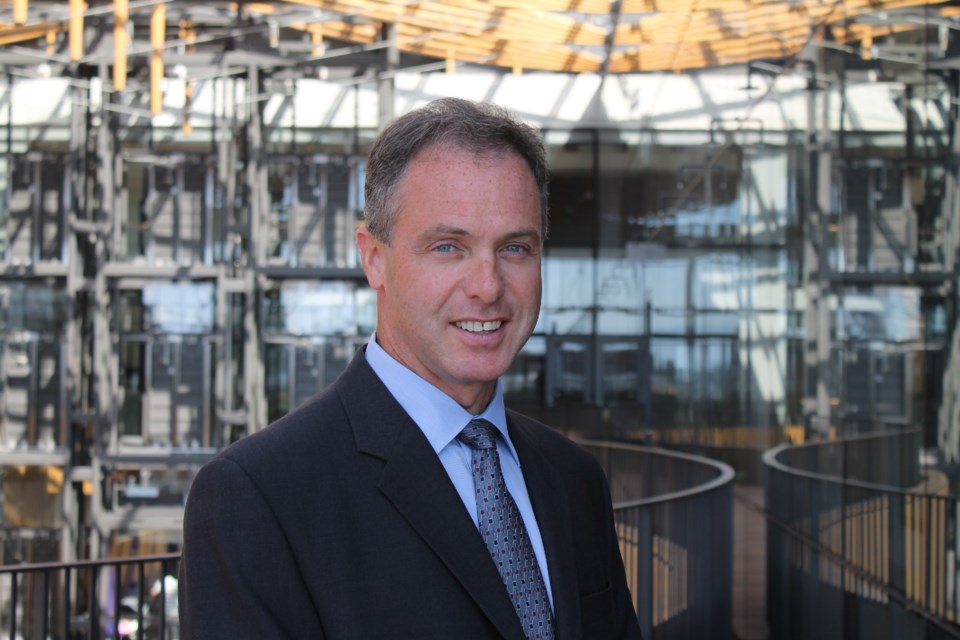B.C. Ferries executive Mark Collins will succeed president Mike Corrigan, who is leaving the organization at the end of March after five years at the helm.
Collins, 55, starts his duties April 1, also under a five-year contract.
He is currently Ferries’ vice-president of strategic planning and community engagement, a position that has taken him along B.C.’s coast to consult with residents.
“Ferries affect communities directly and they affect people’s lives. People need to get to the doctor, people need to get to the supermarket, children need to go to school. These are critical issues that are very personal,” Collins said Friday.
“We need to try to meet their expectations. We don’t always meet them, but we are trying our best. One thing we will be looking for is: ‘How can we continually improve?’ ”
Annual remuneration for the president’s job will be about $495,000, about 10 per cent less than Corrigan’s compensation. Corrigan is heading to Interferry, the global ferry association.
Collins joined the organization in 2004, serving as its vice-president of engineering until 2012. He moved to CSL Group in Montreal in 2012 to serve as vice-president of global technical services before returning to Ferries.
He was B.C. Ferries’ executive director of project management and engineering services from 2014 to 2015.
Collins has 35 years of marine experience, including a stint as president of Rolls-Royce Marine Brazil and Italy, and working as a marine engineer on ships.
He’s looking forward to summer.
“We are looking at what might be the best tourist season in years for B.C.,” Collins said. “B.C. Ferries has a major role to play in helping deliver a great season and we want to be focused on that.”
Affordable fares are a key issue, along with the importance of reliable service, he said.
“We need to continue to invest in the ferry service if we are going to continue to deliver the reliability and the sustainability. But we need to invest such that we also keep it affordable. It is a balance.”
Collins said he will ride ferries to talk to communities, passengers, and front-line staff to “re-acquaint myself with everything that is going on out there.”
Originally from St. John’s, N.L., Collins said boating is a favourite pastime.
He grew up on the water, and was a competitive sailor.
“I was raised on an island, so the salt water runs in the veins. My father taught me how to handle a boat and sailboats about the same time as he taught me to walk.”
Donald Hayes, chairman of Ferries’ board, said Collins has broad experience and specific expertise.
He has in-depth knowledge of Ferries, having been in charge of engineering, shipbuilding and strategy, and knows the organization, Hayes said.
“He hits the ground running.”
Collins has a “brilliant mind and is an excellent communicator,” Hayes said.
A search for a person to fill the job attracted 77 expressions of interest. Six candidates were interviewed.
Brian Hollingshead, co-chairman of the Ferries Advisory Committee, said he is pleased to hear that Collins will be the new president. “I’m very optimistic, quite honestly.”
Collins has been the “den mother for the ferry-advisory committees” and is precise, well-organized and a good listener, Hollingshead said.
“He was very involved in the whole scheduling process of the Salt Spring and Southern Gulf Islands ferry advisory committees, which was pretty intense for a little while.”
Claire Trevena, NDP transportation critic, said: “I would hope that he works very closely with the government to make sure that we do get a ferry system that works for the people of B.C. “And that means fares that are affordable and not the sky-rocketing fares that we have been facing, and schedules that suit the communities, and not simply the workings of the minds of the senior management of B.C. Ferries.”
Todd Stone, B.C. minister of transportation, said: “Mark takes over an organization that has made significant progress over the last four years. And I know that in his current role as vice-president of strategic planning and community engagement, Mark has had a tremendous influence on that success.
“With B.C.’s first natural gas-fuelled ferries coming into service as part of an aggressive fleet-renewal plan, and vehicle traffic up around four per cent so far this year thanks in part to a robust tourism industry, this is an exciting time to be taking over one of the largest coastal ferry services in the world.”



